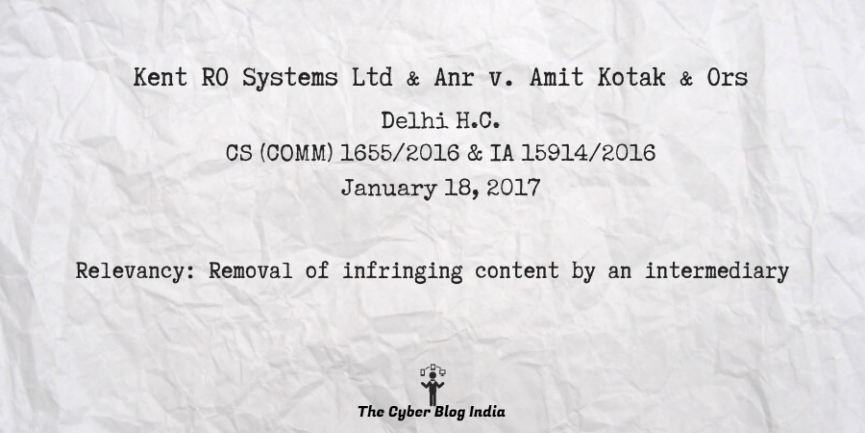Kent RO Systems Ltd & Anr v. Amit Kotak & Ors

Kent RO Systems Ltd & Anr v. Amit Kotak & Ors
(2017) 240 DLT 3
In the High Court of Delhi at New Delhi
CS (COMM) 1655/2016 & IA 15914/2016
Before Justice Rajiv Sahai Endlaw
Decided on January 18, 2017
Relevancy of the case: Removal of infringing content by an intermediary
Statutes & Provisions Involved
- The Information Technology Act, 2000 (Section 79, 79(1), 79(3))
- The Designs Act, 2000 (Section 19, 22)
- The International Technology (Intermediaries Guidelines) Rules, 2011 (Rule 3)
Relevant Facts of the Case
- The plaintiff is the manufacturer of water purifiers and has sought the protection of their water purifier systems.
- Defendant number 1 is a trader of water purifier systems who sells his goods to various customers through the website of defendant number 2.
- The plaintiff laid emphasis on the water purifiers being sold by defendant number 2 that the shape and appearance were similar to that of the plaintiff, therefore constituting piracy under the Designs Act, 2000.
- The defendant undertook that they will remove all the products complained by the plaintiff.
- The plaintiff stated that the larger number of products were being offered for sale and they had not taken any step for removal of the other products.
Prominent Arguments by the Advocates
Counsels on behalf of the plaintiff:
- Relying on Rule 3 of the Information Technology (Intermediaries Guidelines) Rules, 2011, being an intermediary, defendant number 2 is required to conduct due diligence before hosting any content. Section 22(1)(c) of the Designs Act states that even a person who, knowing that the content is infringing, without the consent of the registered proprietor, publishes or exposes or causes to be published or exposed for sale that article, is guilty of piracy of the registered design.
Counsels on behalf of the respondents:
- Section 79 of the Information Technology Act, 2000 shields an intermediary from legal liability for any third party data hosted by him as long as the intermediary’s function is limited to providing access to a communication system over which information made available by third parties is hosted and does not initiate or modify the information contained in the transmission and so long as it observes due diligence while discharging his duties under the Act and the rules prescribed in this behalf.
Opinion of the Bench
- The Intermediary Rules only oblige an intermediary to remove/disable the information hosted on the portal only on receipt of the complaint. The said rules do not oblige the intermediary to, of its own, screen all information being hosted on its portal for infringement of the rights of all those persons who have at any point of time complained to the intermediary. Requiring an intermediary to, on receipt of complaints, take action is different from requiring an intermediary to, of its own, take a call as to what is infringing and what is not. It cannot be read as vesting in the intermediary suo motu powers to detect and refuse the hosting of infringing contents.
- To require an intermediary to do such screening would be an unreasonable interference with the rights of the intermediary to carry on its business.
Final Decision
- The suit is disposed of with parties to bear their own costs.
This case summary has been prepared by Mansi Vats, an undergraduate student at UPES School of Law, Dehradun, during her internship with The Cyber Blog India in June/July 2020.
